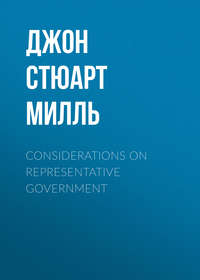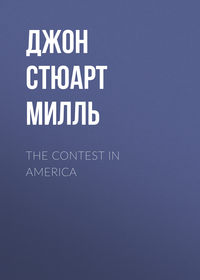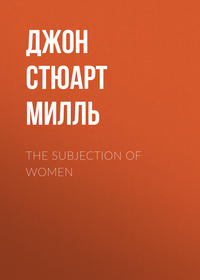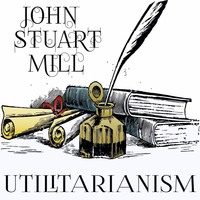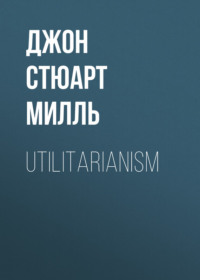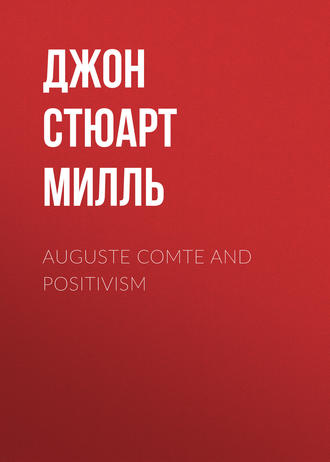 полная версия
полная версияAuguste Comte and Positivism
Worse, however, remains to be told. M. Comte selects a hundred volumes of science, philosophy, poetry, history, and general knowledge, which he deems a sufficient library for every positivist, even of the theoretic order, and actually proposes a systematic holocaust of books in general – it would almost seem of all books except these. Even that to which he shows most indulgence, poetry, except the very best, is to undergo a similar fate, with the reservation of select passages, on the ground that, poetry being intended to cultivate our instinct of ideal perfection, any kind of it that is less than the best is worse than none. This imitation of the error, we will call it the crime, of the early Christians – and in an exaggerated form, for even they destroyed only those writings of pagans or heretics which were directed against themselves – is the one thing in M. Comte's projects which merits real indignation. When once M. Comte has decided, all evidence on the other side, nay, the very historical evidence on which he grounded his decision, had better perish. When mankind have enlisted under his banner, they must burn their ships. There is, though in a less offensive form, the same overweening presumption in a suggestion he makes, that all species of animals and plants which are useless to man should be systematically rooted out. As if any one could presume to assert that the smallest weed may not, as knowledge advances, be found to have some property serviceable to man. When we consider that the united power of the whole human race cannot reproduce a species once eradicated – that what is once done, in the extirpation of races, can never be repaired; one can only be thankful that amidst all which the past rulers of mankind have to answer for, they have never come up to the measure of the great regenerator of Humanity; mankind have not yet been under the rule of one who assumes that he knows all there is to be known, and that when he has put himself at the head of humanity, the book of human knowledge may be closed.
Of course M. Comte does not make this assumption consistently. He does not imagine that he actually possesses all knowledge, but only that he is an infallible judge what knowledge is worth possessing. He does not believe that mankind have reached in all directions the extreme limits of useful and laudable scientific inquiry. He thinks there is a large scope for it still, in adding to our power over the external world, but chiefly in perfecting our own physical, intellectual, and moral nature. He holds that all our mental strength should be economized, for the pursuit of this object in the mode leading most directly to the end. With this view, some one problem should always be selected, the solution of which would be more important than any other to the interests of humanity, and upon this the entire intellectual resources of the theoretic mind should be concentrated, until it is either resolved, or has to be given up as insoluble: after which mankind should go on to another, to be pursued with similar exclusiveness. The selection of this problem of course rests with the sacerdotal order, or in other words, with the High Priest. We should then see the whole speculative intellect of the human race simultaneously at work on one question, by orders from above, as a French minister of public instruction once boasted that a million of boys were saying the same lesson during the same half-hour in every town and village of France. The reader will be anxious to know, how much better and more wisely the human intellect will be applied under this absolute monarchy, and to what degree this system of government will be preferable to the present anarchy, in which every theorist does what is intellectually right in his own eyes. M. Comte has not left us in ignorance on this point. He gives us ample means of judging. The Pontiff of Positivism informs us what problem, in his opinion, should be selected before all others for this united pursuit.
What this problem is, we must leave those who are curious on the subject to learn from the treatise itself. When they have done so, they will be qualified to form their own opinion of the amount of advantage which the general good of mankind would be likely to derive, from exchanging the present "dispersive speciality" and "intellectual anarchy" for the subordination of the intellect to the coeur, personified in a High Priest, prescribing a single problem for the undivided study of the theoretic mind.
We have given a sufficient general idea of M. Comte's plan for the regeneration of human society, by putting an end to anarchy, and "systematizing" human thought and conduct under the direction of feeling. But an adequate conception will not have been formed of the height of his self-confidence, until something more has been told. Be it known, then, that M. Comte by no means proposes this new constitution of society for realization in the remote future. A complete plan of measures of transition is ready prepared, and he determines the year, before the end of the present century, in which the new spiritual and temporal powers will be installed, and the regime of our maturity will begin. He did not indeed calculate on converting to Positivism, within that time, more than a thousandth part of all the heads of families in Western Europe and its offshoots beyond the Atlantic. But he fixes the time necessary for the complete political establishment of Positivism at thirty-three years, divided into three periods, of seven, five, and twenty-one years respectively. At the expiration of seven, the direction of public education in France would be placed in M. Comte's hands. In five years more, the Emperor Napoleon, or his successor, will resign his power to a provisional triumvirate, composed of three eminent proletaires of the positivist faith; for proletaires, though not fit for permanent rule, are the best agents of the transition, being the most free from the prejudices which are the chief obstacle to it. These rulers will employ the remaining twenty-one years in preparing society for its final constitution; and after duly installing the Spiritual Power, and effecting the decomposition of France into the seventeen republics before mentioned, will give over the temporal government of each to the normal dictatorship of the three bankers. A man may be deemed happy, but scarcely modest, who had such boundless confidence in his own powers of foresight, and expected so complete a triumph of his own ideas on the reconstitution of society within the possible limits of his lifetime. If he could live (he said) to the age of Pontenelle, or of Hobbes, or even of Voltaire, he should see all this realized, or as good as realized. He died, however, at sixty, without leaving any disciple sufficiently advanced to be appointed his successor. There is now a College, and a Director, of Positivism; but Humanity no longer possesses a High Priest.
What more remains to be said may be despatched more summarily. Its interest is philosophic rather than practical. In his four volumes of "Politique Positive," M. Comte revises and reelaborates the scientific and historical expositions of his first treatise. His object is to systematize (again to systematize) knowledge from the human or subjective point of view, the only one, he contends, from which a real synthesis is possible. For (he says) the knowledge attainable by us of the laws of the universe is at best fragmentary, and incapable of reduction to a real unity. An objective synthesis, the dream of Descartes and the best thinkers of old, is impossible. The laws of the real world are too numerous, and the manner of their working into one another too intricate, to be, as a general rule, correctly traced and represented by our reason. The only connecting principle in our knowledge is its relation to our wants, and it is upon that we must found our systematization. The answer to this is, first, that there is no necessity for an universal synthesis; and secondly, that the same arguments may be used against the possibility of a complete subjective, as of a complete objective systematization. A subjective synthesis must consist in the arrangement and co-ordination of all useful knowledge, on the basis of its relation to human wants and interests. But those wants and interests are, like the laws of the universe, extremely multifarious, and the order of preference among them in all their different gradations (for it varies according to the degree of each) cannot be cast into precise general propositions. M. Comte's subjective synthesis consists only in eliminating from the sciences everything that he deems useless, and presenting as far as possible every theoretical investigation as the solution of a practical problem. To this, however, he cannot consistently adhere; for, in every science, the theoretic truths are much more closely connected with one another than with the human purposes which they eventually serve, and can only be made to cohere in the intellect by being, to a great degree, presented as if they were truths of pure reason, irrespective of any practical application.
There are many things eminently characteristic of M. Comte's second career, in this revision of the results of his first. Under the head of Biology, and for the better combination of that science with Sociology and Ethics, he found that he required a new system of Phrenology, being justly dissatisfied with that of Gall and his successors. Accordingly he set about constructing one è priori, grounded on the best enumeration and classification he could make of the elementary faculties of our intellectual, moral, and animal nature; to each of which he assigned an hypothetical place in the skull, the most conformable that he could to the few positive facts on the subject which he considered as established, and to the general presumption that functions which react strongly on one another must have their organs adjacent: leaving the localities avowedly to be hereafter verified, by anatomical and inductive investigation. There is considerable merit in this attempt, though it is liable to obvious criticisms, of the same nature as his own upon Gall. But the characteristic thing is, that while presenting all this as hypothesis waiting for verification, he could not have taken its truth more completely for granted if the verification had been made. In all that he afterwards wrote, every detail of his theory of the brain is as unhesitatingly asserted, and as confidently built upon, as any other doctrine of science. This is his first great attempt in the "Subjective Method," which, originally meaning only the subordination of the pursuit of truth to human uses, had already come to mean drawing truth itself from the fountain of his own mind. He had become, on the one hand, almost indifferent to proof, provided he attained theoretic coherency, and on the other, serenely confident that even the guesses which originated with himself could not but come out true.
There is one point in his later view of the sciences, which appears to us a decided improvement on his earlier. He adds to the six fundamental sciences of his original scale, a seventh under the name of Morals, forming the highest step of the ladder, immediately after Sociology: remarking that it might, with still greater propriety, be termed Anthropology, being the science of individual human nature, a study, when rightly understood, more special and complicated than even that of Society. For it is obliged to take into consideration the diversities of constitution and temperament (la réaction cérébrale des viscères végétatifs) the effects of which, still very imperfectly understood, are highly important in the individual, but in the theory of society may be neglected, because, differing in different persons, they neutralize one another on the large scale. This is a remark worthy of M. Comte in his best days; and the science thus conceived is, as he says, the true scientific foundation of the art of Morals (and indeed of the art of human life), which, therefore, may, both philosophically and didactically, be properly combined with it.
His philosophy of general history is recast, and in many respects changed; we cannot but say, greatly for the worse. He gives much greater development than before to the Fetishistic, and to what he terms the Theocratic, periods. To the Fetishistic view of nature he evinces a partiality, which appears strange in a Positive philosopher. But the reason is that Fetish-worship is a religion of the feelings, and not at all of the intelligence. He regards it as cultivating universal love: as a practical fact it cultivates much rather universal fear. He looks upon Fetishism as much more akin to Positivism than any of the forms of Theology, inasmuch as these consider matter as inert, and moved only by forces, natural and supernatural, exterior to itself: while Fetishism resembles Positivism in conceiving matter as spontaneously active, and errs only by not distinguishing activity from life. As if the superstition of the Fetishist consisted only in believing that the objects which produce the phaenomena of nature involuntarily, produce them voluntarily. The Fetishist thinks not merely that his Fetish is alive, but that it can help him in war, can cure him of diseases, can grant him prosperity, or afflict him with all the contrary evils. Therein consists the lamentable effect of Fetishism – its degrading and prostrating influence on the feelings and conduct, its conflict with all genuine experience, and antagonism to all real knowledge of nature.
M. Comte had also no small sympathy with the Oriental theocracies, as he calls the sacerdotal castes, who indeed often deserved it by their early services to intellect and civilization; by the aid they gave to the establishment of regular government, the valuable though empirical knowledge they accumulated, and the height to which they helped to carry some of the useful arts. M. Comte admits that they became oppressive, and that the prolongation of their ascendancy came to be incompatible with further improvement. But he ascribes this to their having arrogated to themselves the temporal government, which, so far as we have any authentic information, they never did. The reason why the sacerdotal corporations became oppressive, was because they were organized: because they attempted the "unity" and "systematization" so dear to M. Comte, and allowed no science and no speculation, except with their leave and under their direction. M. Comte's sacerdotal order, which, in his system, has all the power that ever they had, would be oppressive in the same manner; with no variation but that which arises from the altered state of society and of the human mind.
M. Comte's partiality to the theocracies is strikingly contrasted with his dislike of the Greeks, whom as a people he thoroughly detests, for their undue addiction to intellectual speculation, and considers to have been, by an inevitable fatality, morally sacrificed to the formation of a few great scientific intellects, – principally Aristotle, Archimedes, Apollonius, and Hipparchus. Any one who knows Grecian history as it can now be known, will be amazed at M. Comte's travestie of it, in which the vulgarest historical prejudices are accepted and exaggerated, to illustrate the mischiefs of intellectual culture left to its own guidance.
There is no need to analyze further M. Comte's second view of universal history. The best chapter is that on the Romans, to whom, because they were greater in practice than in theory, and for centuries worked together in obedience to a social sentiment (though only that of their country's aggrandizement), M. Comte is as favourably affected, as he is inimical to all but a small selection of eminent thinkers among the Greeks. The greatest blemish in this chapter is the idolatry of Julius Caesar, whom M. Comte regards as one of the most illustrious characters in history, and of the greatest practical benefactors of mankind. Caesar had many eminent qualities, but what he did to deserve such praise we are at a loss to discover, except subverting a free government: that merit, however, with M. Comte, goes a great way. It did not, in his former days, suffice to rehabilitate Napoleon, whose name and memory he regarded with a bitterness highly honourable to himself, and whose career he deemed one of the greatest calamities in modern history. But in his later writings these sentiments are considerably mitigated: he regards Napoleon as a more estimable "dictator" than Louis Philippe, and thinks that his greatest error was re-establishing the Academy of Sciences! That this should be said by M. Comte, and said of Napoleon, measures the depth to which his moral standard had fallen.
The last volume which he published, that on the Philosophy of Mathematics, is in some respects a still sadder picture of intellectual degeneracy than those which preceded it. After the admirable résumé of the subject in the first volume of his first great work, we expected something of the very highest order when he returned to the subject for a more thorough treatment of it. But, being the commencement of a Synthèse Subjective, it contains, as might be expected, a great deal that is much more subjective than mathematical. Nor of this do we complain: but we little imagined of what nature this subjective matter was to be. M. Comte here joins together the two ideas, which, of all that he has put forth, are the most repugnant to the fundamental principles of Positive Philosophy. One of them is that on which we have just commented, the assimilation between Positivism and Fetishism. The other, of which we took notice in a former article, was the "liberté facultative" of shaping our scientific conceptions to gratify the demands not solely of objective truth, but of intellectual and aesthetic suitability. It would be an excellent thing, M. Comte thinks, if science could be deprived of its sécheresse, and directly associated with sentiment. Now it is impossible to prove that the external world, and the bodies composing it, are not endowed with feeling, and voluntary agency. It is therefore highly desirable that we should educate ourselves into imagining that they are. Intelligence it will not do to invest them with, for some distinction must be maintained between simple activity and life. But we may suppose that they feel what is done to them, and desire and will what they themselves do. Even intelligence, which we must deny to them in the present, may be attributed to them in the past. Before man existed, the earth, at that time an intelligent being, may have exerted "its physico-chemical activity so as to improve the astronomical order by changing its principal coefficients. Our planet may be supposed to have rendered its orbit less excentric, and thereby more habitable, by planning a long series of explosions, analogous to those from which, according to the best hypotheses, comets proceed. Judiciously reproduced, similar shocks may have rendered the inclination of the earth's axis better adapted to the future wants of the Grand Etre. A fortiori the Earth may have modified its own figure, which is only beyond our intervention because our spiritual ascendancy has not at its disposal a sufficient material force." The like may be conceived as having been done by each of the other planets, in concert, possibly, with the Earth and with one another. "In proportion as each planet improved its own condition, its life exhausted itself by excess of innervation; but with the consolation of rendering its self-devotion more efficacious, when the extinction of its special functions, first animal, and finally vegetative, reduced it to the universal attributes of feeling and activity."25 This stuff, though he calls it fiction, he soon after speaks of as belief (croyance), to be greatly recommended, as at once satisfying our natural curiosity, and "perfecting our unity" (again unity!) "by supplying the gaps in our scientific notions with poetic fictions, and developing sympathetic emotions and aesthetic inspirations: the world being conceived as aspiring to second mankind in ameliorating the universal order under the impulse of the Grand Etre." And he obviously intends that we should be trained to make these fantastical inventions permeate all our associations, until we are incapable of conceiving the world and Nature apart from them, and they become equivalent to, and are in fact transformed into, real beliefs.
Wretched as this is, it is singularly characteristic of M. Comte's later mode of thought. A writer might be excused for introducing into an avowed work of fancy this dance of the planets, and conception of an animated Earth. If finely executed, he might even be admired for it. No one blames a poet for ascribing feelings, purposes, and human propensities to flowers. Because a conception might be interesting, and perhaps edifying, in a poem, M. Comte would have it imprinted on the inmost texture of every human mind in ordinary prose. If the imagination were not taught its prescribed lesson equally with the reason, where would be Unity? "It is important that the domain of fiction should become as systematic as that of demonstration, in order that their mutual harmony may be conformable to their respective destinations, both equally directed towards the continual increase of unity, personal and social."26
Nor is it enough to have created the Grand Fétiche (so he actually proposes to call the Earth), and to be able to include it and all concrete existence in our adoration along with the Grand Etre. It is necessary also to extend Positivist Fetishism to purely abstract existence; to "animate" the laws as well as the facts of nature. It is not sufficient to have made physics sentimental, mathematics must be made so too. This does not at first seem easy; but M. Comte finds the means of accomplishing it. His plan is, to make Space also an object of adoration, under the name of the Grand Milieu, and consider it as the representative of Fatality in general. "The final unity disposes us to cultivate sympathy by developing our gratitude to whatever serves the Grand Etre. It must dispose us to venerate the Fatality on which reposes the whole aggregate of our existence." We should conceive this Fatality as having a fixed seat, and that seat must be considered to be Space, which should be conceived as possessing feeling, but not activity or intelligence. And in our abstract speculations we should imagine all our conceptions as located in free Space. Our images of all sorts, down to our geometrical diagrams, and even our ciphers and algebraic symbols, should always be figured to ourselves as written in space, and not on paper or any other material substance. M. Comte adds that they should be conceived as green on a white ground.
We cannot go on any longer with this. In spite of it all, the volume on mathematics is full of profound thoughts, and will be very suggestive to those who take up the subject after M. Comte. What deep meaning there is, for example, in the idea that the infinitesimal calculus is a conception analogous to the corpuscular hypothesis in physics; which last M. Comte has always considered as a logical artifice; not an opinion respecting matters of fact. The assimilation, as it seems to us, throws a flood of light on both conceptions; on the physical one still more than the mathematical. We might extract many ideas of similar, though none perhaps of equal, suggestiveness. But mixed with these, what pitiable niaiseries! One of his great points is the importance of the "moral and intellectual properties of numbers." He cultivates a superstitious reverence for some of them. The first three are sacred, les nombres sacrés: One being the type of all Synthesis, Two of all Combination, which he now says is always binary (in his first treatise he only said that we may usefully represent it to ourselves as being so), and Three of all Progression, which not only requires three terms, but as he now maintains, never ought to have any more. To these sacred numbers all our mental operations must be made, as far as possible, to adjust themselves. Next to them, he has a great partiality for the number seven; for these whimsical reasons: "Composed of two progressions followed by a synthesis, or of one progression between two couples, the number seven, coming next after the sum of the three sacred numbers, determines the largest group which we can distinctly imagine. Reciprocally, it marks the limit of the divisions which we can directly conceive in a magnitude of any kind." The number seven, therefore, must be foisted in wherever possible, and among other things, is to be made the basis of numeration, which is hereafter to be septimal instead of decimal: producing all the inconvenience of a change of system, not only without getting rid of, but greatly aggravating, the disadvantages of the existing one. But then, he says, it is absolutely necessary that the basis of numeration should be a prime number. All other people think it absolutely necessary that it should not, and regard the present basis as only objectionable in not being divisible enough. But M. Comte's puerile predilection for prime numbers almost passes belief. His reason is that they are the type of irreductibility: each of them is a kind of ultimate arithmetical fact. This, to any one who knows M. Comte in his later aspects, is amply sufficient. Nothing can exceed his delight in anything which says to the human mind, Thus far shalt thou go and no farther. If prime numbers are precious, doubly prime numbers are doubly so; meaning those which are not only themselves prime numbers, but the number which marks their place in the series of prime numbers is a prime number. Still greater is the dignity of trebly prime numbers; when the number marking the place of this second number is also prime. The number thirteen fulfils these conditions: it is a prime number, it is the seventh prime number, and seven is the fifth prime number. Accordingly he has an outrageous partiality to the number thirteen. Though one of the most inconvenient of all small numbers, he insists on introducing it everywhere.



